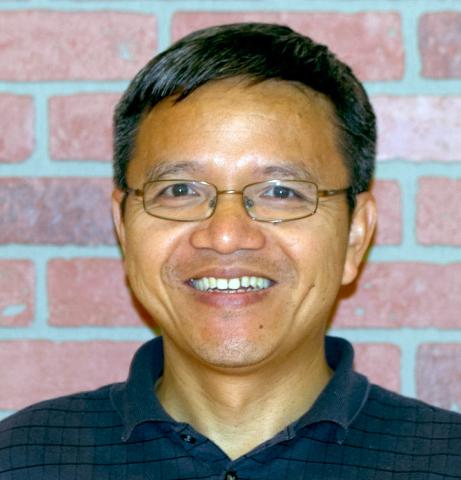Wu-Min Deng, PhD
Professor in Biochemistry and Molecular Biology

Education & Affiliations
Areas of Expertise
Contributions
Yang, S.A., Portilla, J.M., Mihailovic, S., Huang, Y.C., Deng, W.-M. (2019) Oncogenic Notch Triggers Neoplastic Tumorigenesis in a Transition-Zone-like Tissue Microenvironment. Dev Cell. 49: 461-472.
Yang SA, Deng W.-M. (2018) Serrate-Notch Signaling Regulates the Size of the Progenitor Cell Pool in Drosophila Imaginal Rings. Genetics.
Xie, G., Chen, H., Jia, D., Shu, Z., Palmer, W.H., Huang, Y.C., Zeng, X., Hou, S.X., Jiao, R., Deng, W-M. (2017). The SWI/SNF complex protein Snr1 is a tumor suppressor in Drosophila imaginal tissues. Cancer Research, 77(4):862-873.
Tamori, Y., Deng, W.-M. (2017) Tissue-Intrinsic Tumor Hotspot: Terroir for Tumorigenesis. Trends in Cancer, 3, 259-268.
Tamori, Y., Suzuki E., Deng, W.-M. (2016) Epithelial Tumors Originate in Tumor Hotspots, a Tissue-Intrinsic Microenvironment. PLoS Biol. 14(9):e1002537.
Palmer WH, Deng, W.-M. (2015) Ligand-Independent Mechanisms of Notch Activity. Trends Cell Biol. 25(11):697-707.
Tamori, Y., & Deng, W.-M. (2014). Compensatory cellular hypertrophy: the other strategy for tissue homeostasis. Trends Cell Biol. 13, 00186-4.
Palmer WH, Jia D, Deng, W.-M. (2014). Cis-interactions between Notch and its ligands block ligand-independent Notch activity. eLife. 3:e04415.
Tamori, Y., & Deng, W.-M. (2013). Tissue repair through cell competition and compensatory cellular hypertrophy in postmitotic epithelia. Developmental Cell, 25, 350-363. Selected as a Faculty of 1000 paper.
Yu, J., Zheng, Y., Dong, J., Klusza, S., Deng, W.-M.,* Pan, D.* (2010). Kibra functions as a tumor suppressor protein that regulates hippo signaling in conjunction with Merlin and expanded. Developmental Cell, 18, 288–299. PMCID: PMC2858562. (*Deng and Pan are co-corresponding authors.)
Tamori, Y., Bialucha, C. U., Tian, A.-G., Kajita, M., Huang, Y.-C., Norman, M., Harrison, N., Poulton, J., Ivanovitch, K., Disch, L., Liu, T., Deng, W.-M.,* Fujita, Y.* (2010). Involvement of Lgl and Mahjong/VprBP in cell competition. Plos Biology. 8(7):e1000422. PMCID: PMC2903597.(*Deng and Fujita are co-corresponding authors.)
Tian, A. G., and Deng, W. -M. (2008). Lgl and its phosphorylation by aPKC regulate oocyte polarity formation in Drosophila. Development 135, 463–471. PMCID: PMC2753475.
Sun, J., and Deng, W.-M. (2007). Hindsight mediates the role of Notch in suppressing hedgehog signaling and cell proliferation. Developmental Cell. 12, 431–442. PMCID: PMC1851662. Featured in Science’s STKE and Nature Reviews Genetics.
Poulton, J., and Deng, W.-M. (2006). Dystroglycan down-regulation links EGFR signaling and anterior-posterior polarity formation in the Drosophila oocyte. Proceedings of the National Academy of Sciences of the USA 103, 12775–12780.
Complete List of Published Work:
http://www.ncbi.nlm.nih.gov/myncbi/browse/collection/45288136/?sort=date&direction=ascending
Interests
Dr. Deng's laboratory is interested in how cell-cell and cell-tissue microenvironment interactions are involved in normal development and how disruption of such interactions leads to tumorigenesis in the Drosophila model system. Current research projects in the Deng lab include: I. Characterization of “tumor hotspots” in Drosophila epithelial models; II. Postmitotic cell competition and compensatory cellular hypertrophy in Drosophila follicle cells; III. Notch mediated intercellular communication and cell cycle regulation and growth control; and IV. Mechanistic investigation of malignant rhabdoid childhood tumor using the Drosophila model.
Using the genetically tractable Drosophila model, Dr. Deng's research focuses on fundamental questions in cancer biology and developmental biology. The research topics range from understanding how tissue microenvironment contributes to neoplastic tumor transformation and progression to studying how growth and tissue homeostasis are regulated during development and tumorigenesis. The research in his laboratory has led to the development of novel concepts such as tissue “tumor hotspots” and “compensatory cellular hypertrophy,” and publications in high-impact journals. Dr. Deng has received continuous external funding and was awarded the University Developing Scholar Award in 2010 and the Pfeiffer Endowed Professorship for Cancer Research in 2018.
Dr. Deng has extensive experience in mentoring and teaching. Wu-Min was a recipient of the University Honors Mentoring Award in 2013. Among the graduate students and postdoctoral fellows trained in his lab, many have moved on to take faculty positions in various institutions. He has served as an ad hoc member on multiple NIH study sections, and on the editorial boards of Journal of Genetics and Genomics and Scientific Reports. In addition, he has served on numerous departmental and university committees, including the University Council on Research and Creativity, the University Senate, the Promotion and Tenure committee, the Chair Selection Committee, and the Rhodes Scholar committee.
We are currently recruiting postdocs, graduate and undergraduate students for research.
Please also visit us at Deng Lab.
